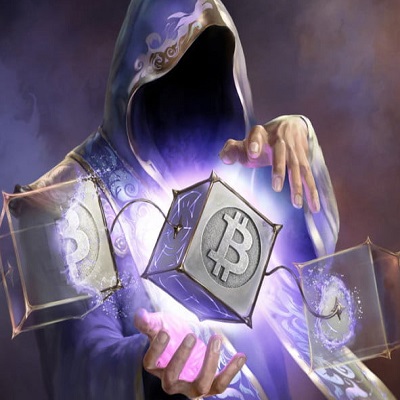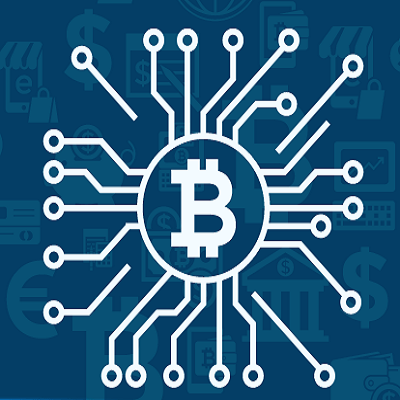Blockchain technology has wowed and mystified tech-enthusiasts around the world. Touted to have the capacity to disrupt the conventional ways in which the processes are carried out, Blockchain has been emerging as an enigmatic game-changer yet people scarcely have awareness of the full extent of its applications. In order to get a grasp on the intricacies of blockchain technology, we spoke to Lumiere CEO Patrice Poujol who is a PhD holder on matters of Blockchain.

Dr Poujol is also an EnTech research expert and a film practitioner. He has 8-year experience in the financial sector and movie finance and 12-year experience as a creative consultant and producer in the movie industry. In 2018, he obtained the first PhD worldwide on the integration of blockchain technology in Creative Media (CityU Hong Kong) through academic exchange with UCLA and participation in the MEFTI programme organised by MIT.

I just wanted to know just a little bit about blockchain where more focus will be on India What are your plans? How do you foresee the market?
Well, we don’t have an exclusive focus on India but funnily enough and this is not something we forced or anything, we have been dealing with some foreign developers, especially in India. Our team is scattered around the world: Hong Kong, Mainland China, USA (San Francisco, Los Angeles), Ecuador, Europe … So It’s completely already decentralised in a way.
Going back to India, and quite frankly it was surprising but India came to us rather than we going to India. We had an article with Anshul Padyal from Humans of blockchain He writes articles about people behind the blockchain project. He was extremely excited about blockchain technologies. He is a computer scientist. I saw a lot of interest coming from India and I saw a presentation on how Blockchain can be used for media.
I won’t tell you much about the technology but you should come to the panel tomorrow.
It’s like the developments of the Internet in 1995. it’s a nascent technology which can have applications in a lot of different fields. I personally know people who started with finance but it has a lot of applications like in Healthcare now, identity, what I mean identity is not “BIG BROTHER” it means when refugee crisis like it happened in Syria. It’s a way to track certain data, not necessarily to say HEY YOU SHOULD BE HERE or YOU’RE DOING SOMETHING WRONG, NO. It’s also a way to keep people safe, if you lose your passport, for example, UNICEF as well there was a hearing for example, where they were giving people value so they can actually buy food, could have a decent living experience. I haven’t been on the ground with these projects so maybe you would want to research about them.

I know Ethereum foundation…
Yes, it has many applications, supply chain management is another sector. I have my doubts about some aspects of it but at some level, it can work with a lot of sectors.
It works particularly well with digital assets. Whether it is about certificate or music or anything that has to do with the creative industry because creative industries are digitised now. Suppose you’ve got an E-book coming out, then you can just get the printout or download it. It’s very simple, you just sign in and that’s it. It’s E now. E-Book, E-Library, CD’s are passé now. Who uses CD’s now? (laughs)
Everything is so accessible now. It’s about accessibility you know anytime, anywhere. I can instantly find my favourite music at the click of a button.
It’s not to say that the physical copies have been wiped out. People still use VHS, vinyl for music but the big chunk of the market is non-physical now. it is digital. When you look at blockchain technology its absolutely possible to have any digital asset recorded in a blockchain, which makes it very easy to track right from the moment it is produced. Companies such as Cinemarket and Vuulr allow the trading (buying/selling) of these rights on their platforms. You will also see people on the panel whose business models can make piracy a thing of the past. make it redundant, that’s the beauty of it. you don’t even need it. The legacy industry has tried to watermark all the content trying to find ways to trace back all the perpetrators trying to find people who are downloading the content immediately and they could never do it successfully but blockchain is thinking about it differently. The current models can shift up to a point where people can watch content for a smaller fee like with White Rabbit, for free, or even in some cases be paid to watch content like with TATATU. Some of these models are consolidating, like White Rabbit and Cinemarket who have integrated their activities to form Motion. The entire business model is shifting, once you have these new models in place, piracy will be irrelevant – why would you pirate content when someone is actually paying you to watch it?

True, it’s only a matter of time as to when it becomes available.
When you pirate, there is always the potentiality of a virus, spybots, etc. Once these models are fully adopted and go through, people in the future will laugh about it saying hey that’s what we used to do (piracy) which doesn’t make sense in the current context.
Then there is a distribution aspect which means traceability in the creative universe that has music and arts under its umbrella, it means that you have centres of power, its about power. Power is at the centre of it. which means money is centralised, it means if you’re a creator it will be very difficult sometime unless you are extremely famous to get paid or to be paid on time and you can ask around.
I have seen that first hand. What blockchain allows is instead of having a human intervention in the system of accountancy with a lot of intermediaries paying you royalties which can be a very lengthy process very costly paper waste which takes time takes forever two years with the royalties that you are going to have. Even for producers, if you want to make your next film, you have to wait for a long time. You have to wait a year and a half before you make your next film but with this system if it’s designed properly, you can collect your royalties direct into your own account (wallet) within days automatically and through micropayments because the problem with royalties and the world we live in today is that they can not send you in paper it is all in cheques so they accumulate on a collection account and when it reaches a certain level then you get paid but with micropayments somebody clicks and only for ten cents and you get paid on it, the transfer doesn’t cost much compared to cheque processing or even a wire transfer with a bank. While these micro-payments are not processed for free, their cost is bound to be fractional.
I don’t want to talk too much about crypto, I’d prefer if you stayed with Blockchain because the thing about cryptos is that it’s another topic altogether.

Obstacles?
I am saying this is what blockchain can do but there are obstacles of a different nature – If I describe these obstacles to you in details, I will have to go quite deep.
Internet is quite centralised
Scalability is an issue… Micropayments are not ready on a global scale but in a year or so, maybe – some companies are working on this. Ethereum, Cardano, there are companies that are trying to solve these issues in micropayments. There are companies that are trying to ensure the security of these payments: companies like Cardano, for example, are working on this.
Your phone and my phone, or whatever device around us for example, become as many nodes that form an alternative decentralised network. At the moment the Internet doesn’t work this way. All these are nodes but they are connected to semi-decentralised servers or now the cloud, which is run by a handful of entities, this creates single points of failure: if the cloud operator goes down, if enough servers go down, it’s all gone. Plus it concentrates power only in a few hands
We can create this network with a system that is completely different from the internet but it still works. even if your phone goes down, the network still exists. Even if all of our phones go down, it’s super resilient. It’s unofficial I heard this is not a new technology it was actually developed in the nineties more than 20 years old. More examples of decentralisation in the past. there is a man (or a group, a movement) who was really important in the development of this technology I am not going to say “Satoshi Nakamoto” no, although that name comes up a lot!
But if you look at visionaries like Nick Szabo who wrote about small contracts very early on in the 1990s, this is a very significant input into the technology that is used today. He is not the only one, there is a group of people, but he is one of the pioneers.
Again I don’t have official proof and it deserves a bit more research, but it is plausible that this technology was created as a resilient system in the case of a major environmental crisis or a global disaster, if the central server goes down, it’s all gone and the data will be lost forever you know but with the blockchain technology the data doesn’t get lost, whether it is good or bad, I cannot tell you… technology is always a double-edged sword… it depends on what humans make of it. But if you put something on it, it can stay forever on the records.
There are pros and cons to it..
This is the real debate but this is not the debate we’re going to have tomorrow but yes on Facebook and traditional sites, you have concerns about privacy and you can work around it but the prospect of something not being erased.. who will you give permission to? Who can access it?
You can delete it?
No, in theory, you cannot delete the data, it will theoretically remain on the chain forever. That’s an obstacle I believe or it can be an amazing feature.
When someone tries to spread fake news, we will know him forever.
The issue of quantum computer attacks has also been raised. I mention it in my book that Quantum computers are not there yet, not for another 10-15 years at least. At the moment, even if you put the collective computer powers of India Russia China U.S.A all put together, you will not be able to change the chain. It’s not exactly true because of the risk of 51 per cent attack, notably in the case of proof of work (PoW) protocols. But it can be a very safe system so I was talking about resilience in terms of quantum computers. Quantum computers are going to be so powerful that some companies such as NEO or Cardano are already thinking about how to go about that, it might upset the entire model. Again I am not a technician at that level but there are people already working on those solutions because they know in 10 years or 15 years it might be a problem otherwise so we are anticipating that we don’t have to regret later. There used to be an environmental effect with respect to the blockchain as well regarding PoW. In order to make transactions immutable, you had to use a lot of computer power and energy. It is not great for the environment. The proof of stake (PoS) method may not use a lot of computational power which means it won’t harm the environment with people staking a certain amount of cryptos as a decentralised collective.
Education – The process can be quite difficult to grasp, so education is key here; institutions such as the Bitcoin Association in Hong Kong, Paxful, or InvestHK have been key to educate people on the use and limitations of blockchain technology. Post .com revolution, we still talk about technology and computer ‘illiteracy’ and we don’t want entire strata of the population left behind or having to deal with the hardship to level up on their own.
You think that crypto will survive in the future because in India it is not that much. In India people still, don’t believe that there is only a small percentage. I have friends who have invested there.
The U.S government is very careful about it now. There has been a lot of scams. It doesn’t mean everything was a scam; some legitimate companies are working today to provide crypto-related solutions. There are people working on ensuring safeguards against scamming also. There are many companies using blockchain technology successfully. There are folks from Ireland who have a ticketing system (Festy.ie). They have already developed a product. Aside from our project, Lumiere and our collaboration with Finfabrik, there are folks such as Motion, Gelos, Breaker, who are doing projects that will support the emerging filmmakers.
It’s a very good project I think.
With India, we talk about global connectivity especially Network internet that is global. Network internet that will be global but legislation and rules in each country depending on the culture you are from are different. If you go to Saudi Arabia you are going to have different laws from the laws in Mumbai if you go to Beijing or Paris or New York. I mean the laws differ from state to state within the USA. That is a difficulty because what is allowed in one jurisdiction is not allowed in the other. And when you have a uniform system like this you can not take everything into account. I think to be able to resolve this, people have to agree collectively.
It will take time. Its implication in the M & E space.
Movies can be a difficult thing because the obstacles are intermediaries and vested interests. People have a great interest in keeping things the way they are. What we wanna do is instead of going head to head with people which is what Netflix did, we are trying to integrate and go for a smooth transition. The journey will take quite a few steps
If done right, it will be very fair and balanced. Or maybe it will be incorporated or restored I don’t know. That’s another obstacle. There is a chance to bring more creativity to get the audience more connected to the content. People are tired of watching the same movies again and again… (sorry to sound racist)… but directed by white guys in their 30’s. Proposing the same thing over and over again. Maybe people want to watch a movie directed by an emerging talented artist such as RIMA DAS. I think it is going to prove a boon for India because you are amazing at making films. They wanna see something else. I think people are ready for this now. At the exception of certain franchises, I think blockbusters shot themselves in the foot.
At Lumiere and Finfabrik, we are planning to change this and offer diversity through transparency in a traditionally obscure industry… in response to this, in 2017, as I was in Los Angeles, a big Hollywood Producer told me that I am going to need a bullet-proof jacket. And I told him that I don’t really care, if I can’t contribute to carrying these changes, many others will…
In India, Have you worked with moviemakers?
Not yet but we are looking to do it.
I can not tell you things because it’s very early on but I will be happy to update you when I do Hopefully by May. India has a very big role to play. You’ve got quite a lot of moviemaking going on there. Dangal was one of my favourite films. Our idea is not telling people what to do but working with people rather as a collaboration. I think India is fascinating because it’s like having several countries within a country. It’s very a very complex set of markets to grasp and penetrate.
